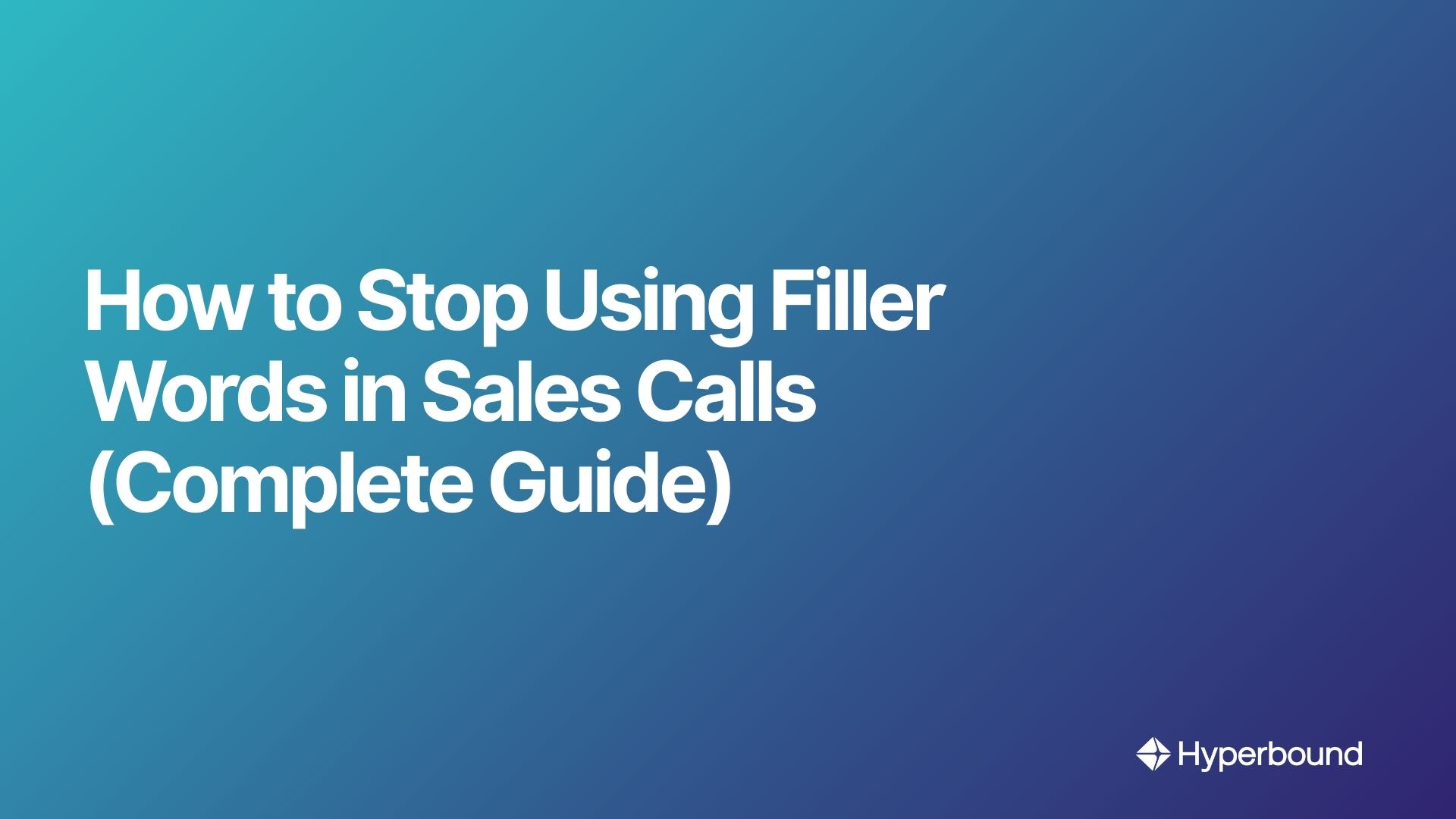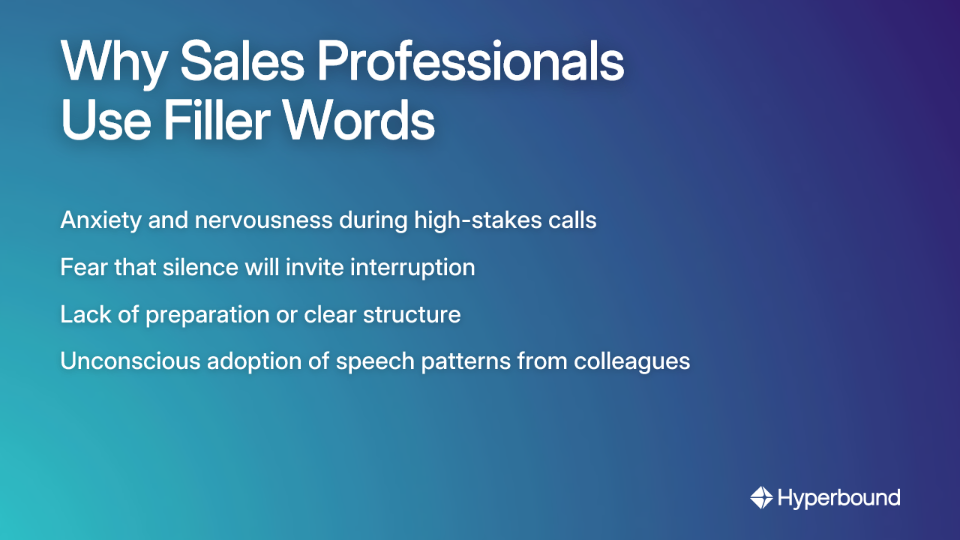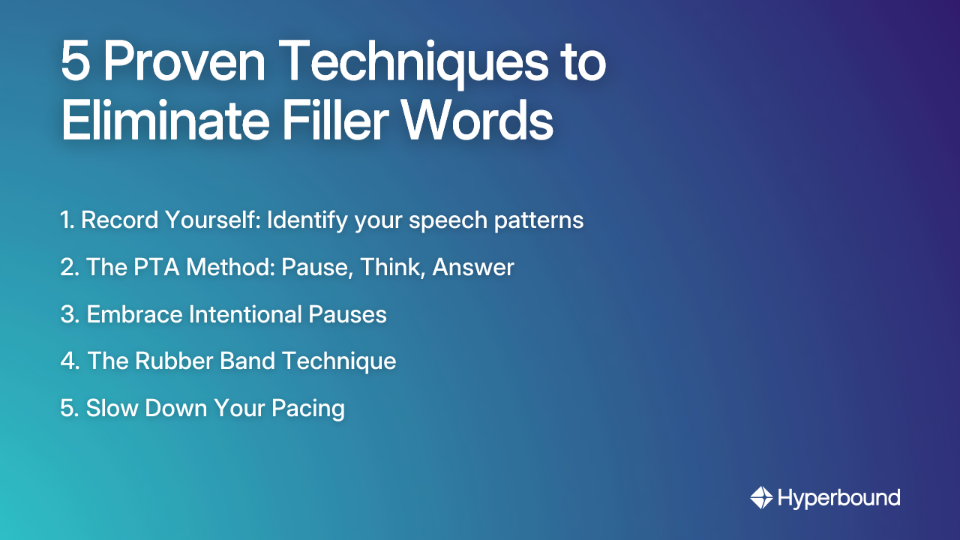
You've just wrapped up a sales call and play back the recording. As you listen, you cringe—there they are again: "um," "like," "you know," and the dreaded "essentially" peppered throughout your pitch. Each filler word feels like a tiny credibility leak, draining authority from what should have been a confident presentation.
If this scenario feels painfully familiar, you're not alone. Many sales professionals struggle with verbal clutter that disrupts their communication flow and potentially costs them deals.
"My 'uhms' would make prospects stop talking," confessed one sales rep in a Reddit discussion. Another lamented, "I'm talking a lot on the calls sometimes even when the prospect wants to talk."
This comprehensive guide will help you understand the psychology behind filler words, quantify their impact on your sales performance, and provide actionable techniques to eliminate them from your sales lexicon.
The Psychology: Why We Can't Stop Saying "Um," "Like," and "Essentially"
Filler words aren't just bad habits—they're symptoms of a deeper cognitive process. Understanding why we use them is the first step toward eliminating them.

It's a Brain-Mouth Mismatch
Filler words occur when our speech outpaces our thoughts. They serve as verbal placeholders while our brain searches for the right words. This mismatch typically happens for several reasons:
- Anxiety and Nerves: When you're under pressure to perform on high-stakes sales calls, your anxiety increases, and so does your filler word usage. Your brain is working overtime to manage both the conversation and your own emotions.
- Holding the Floor: "Um" and "uh" often function as conversational signals that tell the listener, "I'm not done talking yet, I'm just thinking." We fear silence might invite interruption, so we fill it with noise.
- Lack of Preparation: Without enough context or a clear conversational structure, you're more likely to fumble for words and rely on fillers.
- Socially Learned Habit: We unconsciously pick up speech patterns from colleagues and those around us. If your sales team is full of "essentially" users, you might adopt the habit without realizing it.
The Real Cost: How Filler Words Hurt Your Sales Performance
You might think a few "ums" here and there are harmless, but research tells a different story.
The Credibility Killer
According to research by Dr. Frederick Conrad, the success rate of salespeople drops significantly as their use of filler words increases. When sales reps used filler words sparingly (around 2% of their speech), it had a small positive effect. However, usage above 5% was correlated with lower close rates.
Why This Happens:
- Undermined Authority: Excessive filler words make you sound uncertain or unprepared, undermining your position as a trusted advisor.
- Message Dilution: Verbal clutter distracts prospects from your value proposition. Instead of focusing on how you can solve their problems, they're counting your "ums."
- Reduced Listening Time: The more you talk—especially with fillers—the less time your prospect has to share valuable information about their needs and challenges.
As one frustrated buyer noted: "Can tech salespeople stop saying the word 'ESSENTIALLY'?" This sentiment reflects how filler words can become irritating distractions that overshadow your message.

The Ultimate Toolkit: 5 Proven Techniques to Eliminate Filler Words

Now that you understand the why behind filler words, let's dive into how to eliminate them from your sales calls.
1. Record Yourself: The Uncomfortable but Critical First Step
Self-awareness is the foundation of improvement. You can't fix what you don't recognize.
Why it Works: Recording provides objective data on your speech patterns and forces you to confront habits you might not notice in real-time.
How to Do It:
- Record your sales calls (with consent) using your CRM's call recording feature.
- Manually listen for filler words and tally them up, or use a platform like Hyperbound to automatically analyze your recordings for you.
- Identify patterns: Do you use more fillers when explaining technical features? When handling objections?
Pro Tip: While some transcription services scrub "ums" and "ahs," giving you a false sense of clean speech, Hyperbound's AI Real Call Scoring is designed to pinpoint these verbal tics, providing an accurate assessment of your communication habits.
2. The PTA Method: Pause, Think, Answer
This simple three-step method replaces the panicked rush to speak with a deliberate, thoughtful process.
The Steps:
- Pause: When asked a question, take a deliberate one- or two-second pause. This signals thoughtfulness, not hesitation.
- Think: In that pause, quickly formulate the one or two main points of your answer.
- Answer: Deliver your structured response clearly and confidently.
As one sales professional shared on Reddit, "After they stop talking, pause for a solid 5-10 seconds. Just be silent, take a breath and take your time!"
3. Embrace the Power of the Intentional Pause
The intentional pause is perhaps the most powerful tool in your communication arsenal.
Silence is Golden: Reframe silence. It isn't awkward; it's a tool. A well-placed pause can add emphasis, command attention, and give the prospect time to absorb what you've said.
Replace Fillers with Pauses: When you feel the urge to say "um," simply stop. Take a breath. Let the silence hang for a second. This creates a perception of confidence and thoughtfulness.
Research from Duarte suggests that audiences perceive speakers who use intentional pauses as more authoritative and prepared than those who fill every moment with sound.
4. The Rubber Band Technique: A Physical Reminder
This technique uses negative reinforcement to create a powerful physical and mental connection to the habit you're trying to break.
How to Do It:
- Place a rubber band around your wrist
- Every time you catch yourself using a filler word (either live or when listening to a recording), give it a gentle snap
- The mild discomfort creates an immediate awareness of the habit
As one successful salesperson shared: "I kept a rubber band on my wrist, and every time I said 'um' I would snap it, just hard enough to sting. Within a few weeks, I had reduced my filler words by about 80%."
5. Slow Down Your Pacing
Speaking too fast is a primary driver of filler words because your brain can't keep up with your mouth.
The Fix: Make a conscious effort to speak more slowly and deliberately. This reduces anxiety and gives you the mental space to choose your words carefully.
Expert Advice: Aim to reduce your speaking speed from an 8 out of 10 to a 6 out of 10. It will feel uncomfortably slow to you, but will sound calm and collected to your prospect.
Special Strategies for Tech Salespeople: Ditching "Essentially" and "Actually"
Tech salespeople face unique challenges when explaining complex products, which can lead to overreliance on certain filler words. Here's how to address these specific challenges:
Identify Your Triggers
First, pinpoint exactly when words like "essentially" and "actually" appear in your speech:
- Is it when explaining a complex feature?
- When handling technical objections?
- When translating technical concepts to business value?
Build a "Question Tree"
"Create a question tree. You'll find yourself and the prospect having a crafted conversation," advised one successful sales professional on Reddit.
A question tree is a pre-planned conversation flow that helps you navigate discussions more smoothly. When you have a structure, you're less likely to rely on verbal crutches.
How to Build One:
- Map out common conversation paths based on prospect roles and pain points
- Prepare concise explanations for technical concepts in advance
- Practice delivering these explanations without filler words
Replace Technical Fillers with Precise Language
Instead of saying "essentially" before explaining a feature, try these alternatives:
- "In simple terms..."
- "To put it clearly..."
- "What this means for your business is..."
These phrases serve the same function but add value rather than noise to your explanation.
Actionable Exercises to Build Lasting Habits
The Mute Button is Your Best Friend
"The mute button is your best friend," shared a top-performing salesperson. This simple but powerful technique forces you to practice active listening.
How to Use It:
- When the prospect is speaking, hit mute on your phone or headset
- This physically prevents you from interrupting with an "uh-huh" or filler
- Unmute only after they have completely finished their thought
- Take a pause, then respond thoughtfully
Leverage AI-Powered Roleplay for Safe Practice
The fastest way to build new habits is through repetition. However, practicing on live prospects is risky. AI-powered roleplay provides a safe, scalable environment to master filler-free communication.
How it Works:
- Use a platform like Hyperbound's AI Sales Roleplays to practice handling tough questions, explaining complex features, and navigating objections.
- The AI buyer responds realistically, allowing you to drill your talk tracks until they become second nature.
- You get instant, objective feedback on your speech, including filler word usage, so you can rapidly iterate and improve without manager intervention.
Gamify It with Your Team
Create a friendly competition around reducing filler words:
- Have an "'ah' counter" for team meetings or call review sessions
- The person with the fewest filler words wins bragging rights or a small prize
- This builds team accountability and makes improvement fun
Find an Accountability Partner
Ask a peer or manager to listen to your calls and provide feedback:
- Have them signal or note every time you use a filler word
- Review the feedback together and track improvements over time
- Exchange this service with colleagues for mutual improvement
Practice Open-Ended Questions
Asking better questions helps shift the conversation focus from your explanations to the prospect's needs, reducing opportunities for filler words.
Sample Practice:
- Replace "Do you need help with X?" with "What challenges are you facing with X?"
- Instead of "Is that important to you?" try "How would solving this problem impact your business?"
Conclusion: Progression, Not Perfection
Eliminating filler words is not about achieving perfection—it's about making meaningful progress that improves your communication effectiveness and sales outcomes.
Remember these key takeaways:
- Build Awareness: Record yourself and identify your specific filler word patterns
- Implement the PTA Method: Pause, Think, Answer for more thoughtful responses
- Embrace Silence: Replace fillers with intentional pauses
- Use Physical Reminders: The rubber band technique creates immediate awareness
- Slow Down: Give your brain time to formulate clear thoughts
With consistent practice, you'll not only reduce filler words but also become a more confident, persuasive communicator who can maintain better communication flow with prospects, handle sales objections effectively, and ultimately close more deals.

As one sales professional who conquered this challenge noted: "It's getting better but still work in progress." Improvement is a journey, not a destination. The fact that you're reading this guide means you've already taken the first step toward more powerful, filler-free communication.
Start small, track your improvement, and celebrate progress. Your prospects—and your commission check—will thank you.
Frequently Asked Questions
What are filler words in sales?
Filler words are sounds or phrases like "um," "like," "you know," or "essentially" that people use to fill pauses in conversation while they are thinking of what to say next. In a sales context, they often signal nervousness, lack of preparation, or uncertainty, which can damage a salesperson's credibility and authority.
Why do I use so many filler words during sales calls?
You likely use filler words due to a combination of factors, including anxiety during high-stakes calls, a fear of silence, lack of preparation, or simply as a learned social habit from colleagues. It's often a "brain-mouth mismatch," where your speech gets ahead of your thoughts, and your brain uses fillers as verbal placeholders while it catches up.
How do filler words affect my sales performance?
Excessive filler words can significantly hurt your sales performance by undermining your credibility, diluting your core message, and making you sound unprepared or uncertain. Research shows that as filler word usage increases, close rates tend to decrease because prospects can become distracted or annoyed, focusing on your verbal tics instead of your value proposition.
What is the most effective way to stop using filler words?
The most effective way to stop using filler words is to consciously replace them with intentional pauses. This simple technique gives you time to think and makes you sound more confident and thoughtful. You can master this by using the "Pause, Think, Answer" (PTA) method: when you feel the urge to use a filler, pause for a second, formulate your response, and then answer clearly.
How can I practice reducing filler words without risking live deals?
You can practice reducing filler words safely by recording and analyzing your own calls, or more effectively, by using AI-powered roleplay platforms. AI sales roleplay tools like Hyperbound provide a risk-free environment to simulate real sales conversations. You can practice handling objections and explaining complex topics, receiving instant feedback on your filler word usage without jeopardizing a relationship with a real prospect.
Are some filler words worse than others for salespeople?
Yes, while any filler word can be distracting, certain words like "essentially" or "actually" can be particularly damaging for salespeople, especially in tech. These words are often used as a crutch when explaining complex topics, but they can come across as condescending or may minimize the importance of the features you're describing. It is better to use precise, value-driven language like, "What this means for your business is..."
How long will it take to reduce my use of filler words?
You can start seeing a reduction in filler words within a few weeks of consistent, conscious practice, but breaking a long-standing speech habit is a gradual process. The key is consistency. By regularly using techniques like self-recording, the PTA method, and other exercises mentioned in this guide, you will build new, better habits. The goal is steady progress, not overnight perfection.
Book a demo with Hyperbound
.png)













